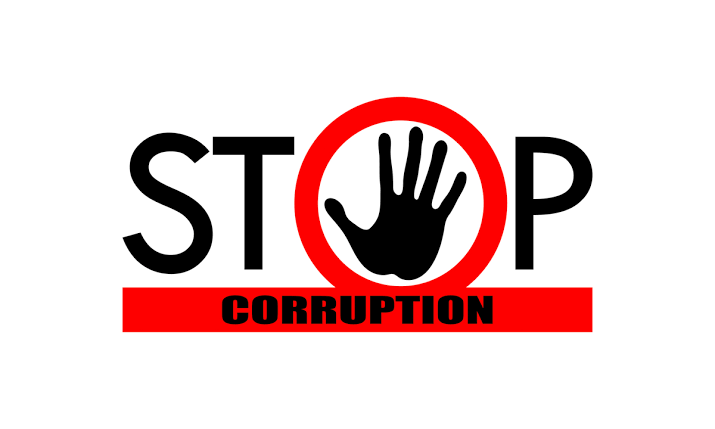CORRUPTION:
The term "corruption" refers to the misuse of authority or position for one's own benefit. It is a problem that has harmed cultures for a very long time and is bad for both people's welfare and the advancement of nations. Bribery, theft, nepotism, and fraud are just a few of the various ways corruption manifests.

Corruption has wide-ranging repercussions that are noticeable in both industrialized and poor nations. When government institutions and services are less effective, bad infrastructure, insufficient healthcare and education systems, and rising poverty result. Additionally, it erodes public confidence in institutions and the government, which lowers civic engagement and raises social unrest.
The absence of openness and accountability in government and commercial practices is one of the main causes of corruption. When persons in positions of authority are not held responsible for their actions, corruption can flourish. In addition, poverty and inequality may fuel corruption by encouraging those in authority to use their positions for personal benefit.
It is crucial to deal with corruption's core causes in order to counteract it. This may be achieved through fostering good governance, enhancing openness and accountability in corporate and government operations, and developing an ethical culture. In order to guarantee that individuals who participate in corrupt behavior are held accountable for their acts, it is also critical to have efficient reporting and investigation processes for corruption.
The international community must participate in efforts to prevent corruption. This includes helping poor nations fight corruption, advancing the rule of law, and attempting to end corruption in global commercial practices. It is critical to understand that corruption is a worldwide issue that calls for a concerted effort to properly solve.
CAUSES OF CORRUPTION:
The beginnings of corruption are many since it is a complex social, political, and economic issue. Some of the most frequent reasons for corruption are listed below:
-
Weak governance: Corruption is more likely to occur when government institutions and mechanisms are weak. This can happen in nations with weak legal systems, poor regulatory structures, and weak enforcement mechanisms.
-
Lack of openness and accountability: Situations where there is a lack of transparency and accountability frequently foster corruption. Corrupt practices are made possible when public servants and private citizens are not held accountable for their activities.
-
Greed and selfish motives: People who pursue personal gain at the expense of the greater good are often the source of corruption. When public servants are driven by greed, ambition, or a desire for power, this can occur.
-
Poverty and inequality are two factors that might contribute to corruption. When individuals are struggling to make ends meet and cannot access essential services, they may resort to dishonest means to obtain what they require.
-
Cultural and social norms: In certain countries, engaging in dishonest behavior is accepted or even required in order to succeed. These social and cultural standards may be a factor in corruption.
-
Multinational factors: Corruption may also be influenced by globalization, foreign aid, and international trade. These elements can facilitate corruption and make it simpler for people to transfer funds and items across international borders.
Overall, fighting corruption necessitates a diverse strategy that addresses the problem's underlying roots since it is a complicated issue with several underlying causes.
COUNTRIES WHICH ARE BADLY EFFECTIVE BY CORRUPTION:
Worldwide, there are numerous nations that are severely impacted by corruption. An annual Corruption Perceptions Index (CPI), produced by Transparency International, a worldwide anti-corruption organization, rates nations according to their perceived levels of public sector corruption.
The following are the top 10 most corrupt nations in the world, listed from highest to lowest according to the most recent 2021 CPI:
-
Somalia
-
South Sudan
-
Syria
-
Yemen
-
Venezuela
-
Sudan
-
Afghanistan
-
Equatorial Guinea
-
Libya
-
Democratic Republic of Congo
It is crucial to remember that corruption is a complicated problem that shows itself in varied forms and intensities in different nations and areas of the world. Corruption may have a disastrous effect on economies and society, causing inequality, poverty, and a lack of confidence in governmental institutions. A diversified strategy is needed to combat corruption, one that emphasizes responsibility, openness, and good governance.
EFFECT OF CORRUPTION ON AFGHANISTAN:

Afghanistan has been plagued by corruption for decades, and it has had a significant impact on the country's political, economic, and social stability. Corruption is a systemic problem in Afghanistan, and it has undermined the country's development and fueled insecurity and conflict. In this article, we will explore how corruption has affected Afghanistan, including its effects on governance, development, and security.
Effects on Governance
Corruption has had a significant impact on governance in Afghanistan. Government officials have been known to engage in corrupt practices, such as taking bribes and misusing public funds, which have eroded public trust in the government. This lack of trust has undermined the legitimacy of the government and made it difficult for it to provide basic services to its citizens. Corruption has also allowed powerful individuals and groups to influence government policies and decisions, often to the detriment of ordinary citizens.
Effects on Development
Corruption has also had a significant impact on development in Afghanistan. The country has received billions of dollars in foreign aid over the past two decades, but much of it has been lost to corruption. This has made it difficult to implement development projects and provide basic services such as healthcare, education, and clean water. Corruption has also deterred foreign investment, which is essential for economic growth and job creation.
Effects on Security
Corruption has had a direct impact on security in Afghanistan. Corrupt officials have often colluded with criminal and insurgent networks, allowing them to operate with impunity. This has fueled insecurity and conflict, as these networks have been able to carry out attacks and other criminal activities without fear of retribution. Corruption has also undermined the capacity of security forces, as corrupt officials have often siphoned off resources meant for training and equipping the forces.
Addressing Corruption in Afghanistan
Addressing corruption in Afghanistan is a complex task, but it is essential for the country's stability and development. The Afghan government has taken some steps to tackle corruption, including the establishment of an anti-corruption commission and the implementation of measures to improve transparency and accountability. However, much more needs to be done.
One key area that needs to be addressed is the culture of impunity for corrupt officials. Too often, corrupt officials are not held accountable for their actions, which reinforces the perception that corruption is an acceptable practice. Strengthening the rule of law and ensuring that corrupt officials are prosecuted and punished is essential for changing this culture.
Improving transparency and accountability is also essential for addressing corruption in Afghanistan. This includes measures such as implementing open procurement processes and strengthening oversight mechanisms. Additionally, improving public awareness and engagement is essential for building a culture of accountability and transparency.
Corruption has had a significant impact on Afghanistan, undermining governance, development, and security. Addressing corruption is essential for building a stable, prosperous, and secure Afghanistan. This will require a concerted effort by the Afghan government, civil society, and the international community to implement measures that promote transparency, accountability, and the rule of law. By taking these steps, Afghanistan can begin to address the root causes of corruption and build a more stable and prosperous future for its citizens.
EFFECT OF CORRUPTION ON SYRIA:

Corruption is a significant problem in many countries around the world, and Syria is no exception. The Syrian government has been plagued by corruption for many years, and the impact of corruption on the country and its people has been devastating. In this article, we will explore how corruption has affected Syria, including its impact on the economy, political stability, and human rights.
Impact on the Economy
Corruption has had a significant impact on the Syrian economy, with the country ranking poorly on measures of transparency and accountability. Inefficient government policies, bribery, and embezzlement of public funds have resulted in a lack of investment, limited economic growth, and high levels of poverty. Corruption has also deterred foreign investment, making it difficult for Syria to compete in the global economy.
One of the most significant examples of corruption in Syria is the mismanagement of public funds by government officials. This has led to the diversion of funds that could have been used to improve infrastructure, healthcare, and education in the country. The result has been a decline in living standards for many Syrians, with poverty rates increasing and access to basic services becoming more limited.
Impact on Political Stability
Corruption has also had a significant impact on political stability in Syria. The Syrian government has long been accused of human rights violations, including the use of torture, arbitrary arrests, and extrajudicial killings. Corruption has played a role in perpetuating these abuses, with government officials using their positions of power to enrich themselves and their allies.
Corruption has also undermined the legitimacy of the Syrian government, with many Syrians feeling that the government is not working in their best interests. This has fueled unrest and protests in the country, which have been met with a violent crackdown by government forces. The ongoing civil war in Syria, which began in 2011, has been fueled in part by corruption and a lack of government accountability.
Impact on Human Rights
Perhaps the most significant impact of corruption in Syria has been on human rights. Corruption has led to a lack of access to basic services, including healthcare and education, for many Syrians. This has resulted in a decline in living standards, with many Syrians struggling to make ends meet.
Corruption has also contributed to the ongoing conflict in Syria, with government officials and their allies accused of committing war crimes and crimes against humanity. These abuses have been well-documented by international human rights organizations, who have called for accountability for those responsible.
Corruption has had a devastating impact on Syria and its people, with the economy, political stability, and human rights all affected by this pervasive problem. While efforts have been made to combat corruption in Syria, including the establishment of anti-corruption agencies, progress has been slow. The ongoing civil war in the country has made it difficult to address corruption effectively, with the conflict and political instability making it difficult to establish strong institutions and accountability mechanisms.
The international community has a role to play in supporting efforts to combat corruption in Syria, including providing resources and expertise to anti-corruption agencies and promoting transparency and accountability in government institutions. Additionally, efforts must be made to address the root causes of corruption, including poverty, inequality, and a lack of access to basic services. By addressing these underlying issues, it may be possible to reduce the prevalence of corruption in Syria and promote a more just and equitable society for all Syrians.

CONCLUSION:
Worldwide, cultures and economies are negatively impacted by the complicated and ubiquitous issue of corruption. Increasing accountability and transparency, fostering good governance, and fostering an integrity-based culture are all necessary components of a multidimensional strategy to combat corruption. We can improve the future for everybody by cooperating to fight corruption.


You must be logged in to post a comment.